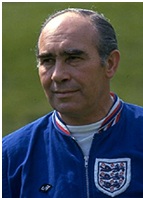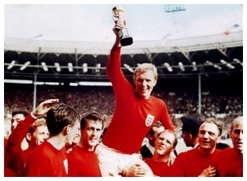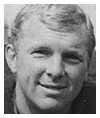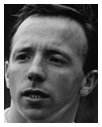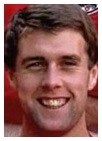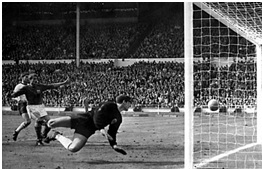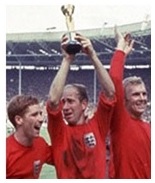|
 |
|
 |
|
|
||
Alf Ramsey Leadership
Alf Ramsey (1920-99)
England’s most successful football (or soccer) manager (pictured right) who led England to victory in the 1966 World Cup. Eventually sacked in 1973 and died in obscurity, ostracized and forgotten by the football establishment but not by his players....
Why did he lead England to victory in 1966?
1. Purpose and self-belief His aim was to win the World Cup and constantly told his players they would win, so that they would share his tremendous self-belief in victory. “We will win the World Cup”, he told them in 1964 after a 5-1 defeat by Brazil. 2. Service with empowerment He always put his players first (the 1966 winners are pictured right) by
3. Players He picked the right players for the team including three of the world’s greatest
He dropped the people’s favourite goal scorer, Jimmy Greaves, in favour of Geoff Hurst , who scored a hat-trick in the World Cup final! 4. Teamwork When the England defender, Jack Charlton (brother of Bobby, pictured right in 1965), asked why he chose him, Ramsay said “I don’t necessarily pick the best players, but I always try to pick the best team”. He had great support from his players and coaching staff (Les Cocker, Wilf McGuinness and Harold Shepherdson). He managed to create a fantastic team spirit through:
a) their common purpose (victory).
b) camaraderie (involving every player in all leisure and coaching activities). c) intense loyalty (shown, for example, by his steadfast refusal to drop Nobby Stiles, pictured right, after a bad tackle against France in the 1966 World Cup).
5. Tough love He was a strict disciplinarian, stamping out alcohol and never afraid to criticize a player in
front of the rest of the team. He always made clear that he was in charge After Geoff Hurst (pictured right) once said “See you at the next game”, Ramsay replied “If selected, Geoffrey, if selected”. His brutal training regime guaranteed the players’ peak fitness that proved crucial in the final, when the match went into extra time. But he was often kind and sensitive to players’ needs and treated them like adults, relying on their self-motivation and appealing to their part in the team’s success, if they were ill-disciplined.
6. Communication He was quiet and modest but his team talks were concise and inspirational. In the 1966 World Cup final England were shocked by a late German equaliser and so faced 30 minutes of extra
time. Instead of telling them off, he calmly explained that the exhausted Germans were “finished” and famously said: “You’ve won the World Cup once. Now go out and win it again”. Geoff Hurst's controversial goal in extra time is pictured right.
7. Character and mutual trust He was decent and unpretentious with great integrity. He did what he said and shared the same values as the players – honesty, dignity, courage and selfless devotion to the team. They wholeheartedly returned the trust and respect he gave them.
8. Strategy and tactics He successfully introduced a three man attack, supported by an attacking Bobby Charlton (pictured right holding the World Cup with Alan Ball, left, and Bobby Moore) with two others in midfield. Ramsey had a great eye for detail and carefully briefed the players to nullify the opposition’s strengths and exploit their weaknesses.
9. Placid passion He was passionate about football and immensely calm in a crisis. His emotional self-control was particularly shown by his placid response to the Germans’ late equaliser, even though he was fuming inside.
10. Happy marriage His wife, Vickie, was always very supportive and gave him solace and contentment away from the
problems of football.
Key quote on success Football, my country and my wife (the three things that mattered most to him).
Key quotes on leadership You’ve won the World Cup once. Now go out and do it again (to his players just before extra time in the World Cup final). We will win the World Cup. I believe it and you must believe it and the nation must believe it (to the England players in 1964). If I showed confidence in them, they would have confidence in me (talking about his players).
Key quote on teams I don’t necessarily pick the best players, but I always try to pick the best team
|
|
|
||
|
|
||
| Copyright © wisdomtowin.com 2025 All Rights Reserved | ||
|


